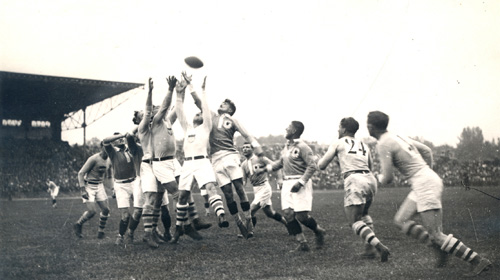The events that didn’t make it to Beijing

This 1924 photo provided by the French Olympic Committee VIA United States Olympic Committee Photo Archive shows a game of rugby being played at the 1924 Olympics in France. There have been bigger, more mainstream sports dropped from the Olympic docket. The Associated Press
July 8, 2008
If you’ve been swimming, you probably tried it at least once: dive into the water and see how far you can get without taking a stroke. Coast past 62 feet and you could have earned a gold medal at the 1904 Olympics.
The tug-of-war you played with friends at school? That could have been worth a podium spot at six Games. A gym class favorite like the rope climb and a game that looked like hopscotch – the standing hop, step, jump – also were once medal events.
Long before the corporate sponsorships and billion-dollar television deals, the Olympic Games were more like games kids might play in the backyard. Some of the events may seem a bit strange – club swinging, anyone? – but there was certainly a fun factor to the early days of the Olympics.
“It’s was a different thing, kind of catch as catch can, particularly the very early days before it got formalized,” said David Wallechinsky, vice president of the International Society of Olympic Historians. “Eventually, as it got bigger, they had to take it a lot more serious.”
The first few modern Olympics, which started in Athens in 1896, were loosely organized. There were no national teams – athletes could just sign up, pay an entry fee and compete – and the host countries were allowed to pick what events were to be held.
Get The Daily Illini in your inbox!
That changed after World War I, when the International Olympic Committee took over selection of the Olympic program because Sweden wouldn’t allow boxing at the 1912 Stockholm Games.
And while there has always been a political slant to the Olympics – St. Louis pulled a back-room deal to snatch the 1904 Games from Chicago – there wasn’t much worldwide attention paid to the early Games.
A wild finish in the marathon at the 1908 Games – Italy’s Dorando Pietri was disqualified for being helped across the finish line by two officials after collapsing several times – and the Nazi presence at the 1936 Berlin Games helped increase media interest, eventually turning the Olympics into the financial and political monster of today.
Before all that happened, though, the Olympics were a more simple affair, filled with some, uh, interesting events.
One was the dueling pistols at the 1906 Athens Summer Olympics. Despite the Wild West connotations, the participants didn’t actually shoot each other; they fired upon mannequins dressed in frock coats with bull-eyes on their chests.
Running deer shoot, where participants shot at moving cutouts of animals, was another worse-than-it-sounds competition.
For the authentic blood and guts, you’d have to go back to the 1900 Paris Games and live pigeon shooting. Nearly 300 birds were killed during the release-and-shoot competition, leaving a mess of feathers and blood after an event that clearly wouldn’t fly today.
Less violent and perhaps more fun were some of the swimming events. There was the diving plunge – the aforementioned coasting event – and an underwater race, where swimmers earned points based on how long they could hold their breath and how far they could get before coming up for air.
The swimming obstacle race in 1900 was another unusual one, with swimmers climbing up and down a pole, then over and under and boats in the Seine River. Surely, some kid at the local swimming pool made that one up.
Club swinging, held during the 1904 and 1932 games, would certainly fall into that category. Like rhythmic gymnastics with bowling pins or juggling without letting go, club swinging featured competitors whirling clubs around their bodies in various patterns. The threat of getting donked on the head like the Three Stooges would have been enough to get people to watch.
Because of that, it’s unlikely potential fan favorites like swimming obstacle course and club swinging will make it back to the podium.
“It’s too bad,” Wallechinsky said. “Some of them I pull for because it’s funny and I think it’s something people can relate to.”






